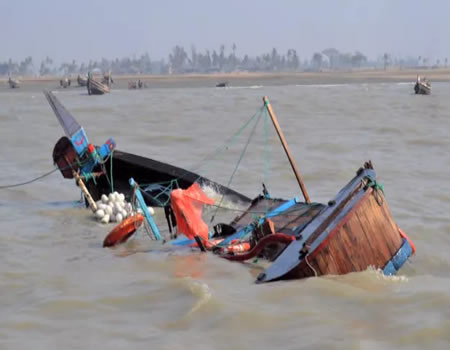In Bayelsa State, a corps member also lost his life in a boat accident. A similar tragedy on July 28 claimed the lives of six out of 25 passengers on board a boat which capsized along the Abonnema-Bakana waterways in Degema, Rivers State. Again, an agency report established that at least 99 persons died in six boat accidents that occurred in Kebbi, Niger and Lagos states between April and September 2017, while an unspecified number of persons got missing. The worst of the tragedies was recorded in Kebbi on September 14 when 53 persons, mostly traders, lost their lives on River Niger while on their way to Poll market in Bagudo Local Government Area. Also in Kebbi State, seven persons out of 150 passengers returning from Malali market in Ngaski Local Government Area of the state on April 15 died when their overloaded boat hit a tree trunk on River Niger, forcing it to capsize. In Niger, 30 persons also died in two boat accidents that occurred on River Niger.
ALSO READ: Fayemi reinstates 5 Permanent Secretaries sacked by Fayose
In Lagos, a boat travelling from CMS to Ikorodu also capsized, claiming five lives in July. The tragedy came after a May 25 incident in which 24 passengers escaped death when two boats collided and capsized at 7:45pm close to the Ojo Terminal. Sometime last year, 12 passengers died in another boat accident in the Ilashe area of the state. Similarly, a police sergeant, Mary Adesoba, lost her life on October 10, 2017 after a boat capsized on the Third Mainland Bridge waterways with the boat operator fleeing the scene of the accident. The boat was en route Ebute-Ero from Ikorodu when it hit a submerged object. Despite the scale of the tragedies, the authorities have stepped up awareness campaigns encouraging Nigerians to patronise the waterways as a veritable alternative to road transport. But the public appears secptical of the advocacy. A passenger was for instance quoted in a report as saying: “How can the government tell us to use the waterways when people die there every time? Except the regulators and operators are able to regulate it and ensure that certain standards are maintained, as is obtainable in other parts of the developed world, we can’t risk our lives on the water.”
Available statistics indeed show that increased patronage of water transport has led to a corresponding rise in fatal accidents on the country’s waterways. Overloading, careless driving, negligence, turbulent weather and wreckage have sustained the ugly trend. Boat operators’ uncontrolled appetite for profit is indexed by overloading, especially during festive seasons and peak periods. For example, about 47 persons died in River Buruku, Delta State, when the wooden boat conveying them capsized in the middle of the river. The majority of the victims were drunken young fun seekers. Collision is a major factor owing to poor visibility, speeding, careless driving, loss of control, inexperience and inattention among boat operators and passengers.
Official records indicate that 22 out of the 36 states in the country use water as a means of transport. The country has the second largest waterways in Africa with 8,600 kilometres of inland waterways and an extensive coastland of about 852 kilometres. Cross River, Rivers, Bayelsa, Niger and Lagos states record the highest fatalities on the waterways. Agencies like the National Inland Waterways Authority (NIWA) have therefore expressed disgust at the situation, threatening to ban operators with rickety speedboats that put the lives of passengers at risk. Certainly, the imperative of more pragmatic measures to curb the menace cannot be overemphasised. Otherwise, public confidence in waterways transport in the country will be eroded. There should be no half measures in getting operators to comply with safety guidelines and the global best practices. The authorities should stop night sailing, as the law only permits sailing between 6 a.m. and 6 p.m. They should guard against overloading, instill discipline in operators in view of the sensitive nature of their business, and insist on the use of life jackets by all passengers while ensuring the sea worthiness of boats. It is clear that these rules of engagement are not being enforced at the moment.
Needless to say, the relevant agencies must punish erring operators while not ignoring their genuine complaints, one of which is the danger posed by floating substances like plastic containers and logs. All stakeholders should recognise the grave consequences of boat accidents, including the trauma inflicted on the victims’ families. In most instances, the victims are breadwinners and in the most productive stage of their lives.






